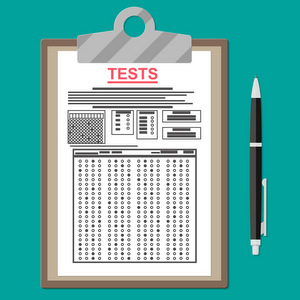Thanks ever so much for your invaluable tips. I would (even now) get quite apprehensive about others' writing speeds and how quickly they'd finish and put their heads down on the table. Usually they're the ones who score the lowest in my class!
Dieu vous bénisse et Bonne chance!
 When you need to take an official French test like the DELF / DALF, there’s more to think about than just your French knowledge. In addition to being mentally prepared, you need to take care of yourself physically. This list will help you do your best on the test.
When you need to take an official French test like the DELF / DALF, there’s more to think about than just your French knowledge. In addition to being mentally prepared, you need to take care of yourself physically. This list will help you do your best on the test.
The night before the test
Prepare your supplies: If the test requires that you bring anything, such a special type of pencil or paper, pack extra into your bag along with a bottle of water, your keys and wallet, and everything else you need so that in the morning you can just grab your bag and go, rather than running around looking for these essentials.
Sleep well: Don’t stay up all night cramming for the test, and don’t wake up at the last minute. Set your alarm to a reasonable hour that will give you enough time to eat, get ready, and look over your notes one last time.
The morning of the test
Dress in comfortable clothes: Don’t worry about squeezing yourself into fashionable skin-tight jeans – wear something that you’ll feel comfortable sitting in for the duration of the test.
Wear a watch: Your phone will probably not be allowed, so wear a watch that allows you to keep an eye on the time.
Eat well: A healthy breakfast will give you energy, but don’t stuff yourself, which could lead to lethargy.
Right before the test
Go to the bathroom: The last thing you want is to be worrying about whether there are bathroom breaks.
Be early: Plan to be seated comfortably in the exam room and ready to go at least 5 minutes before the scheduled start time.
During the test
Read carefully: Be sure to read the directions – don’t assume you know how the test works.*
Assess: Look over the whole test quickly so that you can get a sense of where you might need to allow more time.
Reread questions: Make sure you understand exactly what each question is asking for.
Relax: Don’t stress out over an answer you don’t know – just keep a positive attitude, breathe, do your best, and move on to the next one.
Ignore other people: Don’t worry about how quickly they’re writing or whether they finish before you. It’s not a competition between you and them – it’s a test of your French ability.
Review: If you have time, check over your answers, but don’t doubt yourself. While it’s not true that your first answer is usually correct,** you don’t want to just change things randomly. Take the time to consider your options and choose the one that feels right.
After the test
Take a deep breath and pat yourself on the back: You did it!
Notes
* For an extreme case of the importance of this, take a look at Following Directions.
** Multiple-Choice Tests: Why Sticking With Your First Answer is (Probably) Wrong
More about French Tests
Comments: 2
Useful tips, as always. I would also add to try and sit near the audio equipment to be able to hear it well.